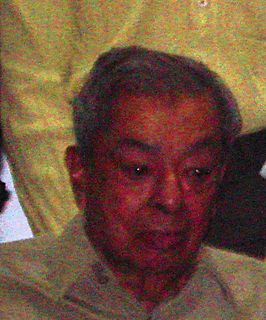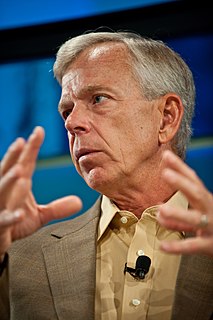A Quote by Michael Spence
For physical goods, there are costs associated with logistics and lead times, owing to inventories and poor forecasts of the market. With digital capital-intensive technology, however, production will inevitably move toward the final market, wherever it is. This re-localization constitutes a major shift in the structure of global supply networks.
Related Quotes
We are talking about capital-intensive enterprises, so market certainty is the key. Investors and entrepreneurs have to know that there will be a guaranteed U.S. renewable energy market in which they can compete. Otherwise, they will create the next generation of green companies and green jobs in Asia, not here.
The essence and the glory of the free market is that individual firms and businesses, competing on the market, provide an ever-changing orchestration of efficient and progressive goods and services: continually improving products and markets, advancing technology, cutting costs, and meeting changing consumer demands as swiftly and as efficiently as possible.
Outside the firm, price movements direct production, which is co-ordinated through a series of exchange transactions on the market. Within a firm, these market transactions are eliminated and in place of the complicated market structure with exchange transactions is substituted the entrepreneur-co-ordinator, who directs production.
Globalization, meaning the global expansion of a market economy, is the only way we can guarantee widespread prosperity and peace. A lot of nations are just so small, that unless they can sell their goods and services on the market they're never going to develop, they don't have an internal market that's big enough to sustain anything.
We must continue to liberalise the single market, cut red tape and basically create a digital single market. We have not completed the single market yet, there is not sufficient free movement of goods, labour, services and money. We have to keep on working at that against all the protectionist tendencies that we have right now.
A split between the U.S. and its traditional allies, if it becomes a permanent feature of the new global order, would lead to deeper fragmentation among the world's market-oriented democracies. That will surely shift the long-term balance of power in China's favor, as it moves steadily toward becoming the world's largest economy.
A global financial cabal engineered a fraudulent housing and debt bubble [2008], illegally shifted vast amounts of capital out of the US; and used 'privatization' as a form of piracy - a pretext to move government assets to private investors at below-market prices and then shift private liabilities back to government at no cost to the private liability holder Clearly, there was a global financial coup d'etat underway.
The way to improve productivity is not to bring in experts to talk about inputs - seed, equipment and materials, pesticides or water supply. The way to start is to provide an assured market, a fair price, and a system through which rural producers can market their produce which is reasonably efficient and can transfer to them the maximum share of the consumers' money. If such a structure is erected, the producers will then seek the inputs and materials they need to increase their production and productivity.
The other players of job market are Global Competitors, the glamour corporations in high technology, telecom, entertainment, consumer products and pharmaceuticals who are the headline makers as they move jobs, services and production around the globe. They pay the highest salaries, but offer little in terms of job security, training, or careers.
At Verizon, we've been strategically investing in emerging technology, including Verizon Digital Media Services and OTT, that taps into the market shift to digital content and advertising. AOL's advertising model aligns with this approach, and the advertising platform provides a key tool for us to develop future revenue streams.
































